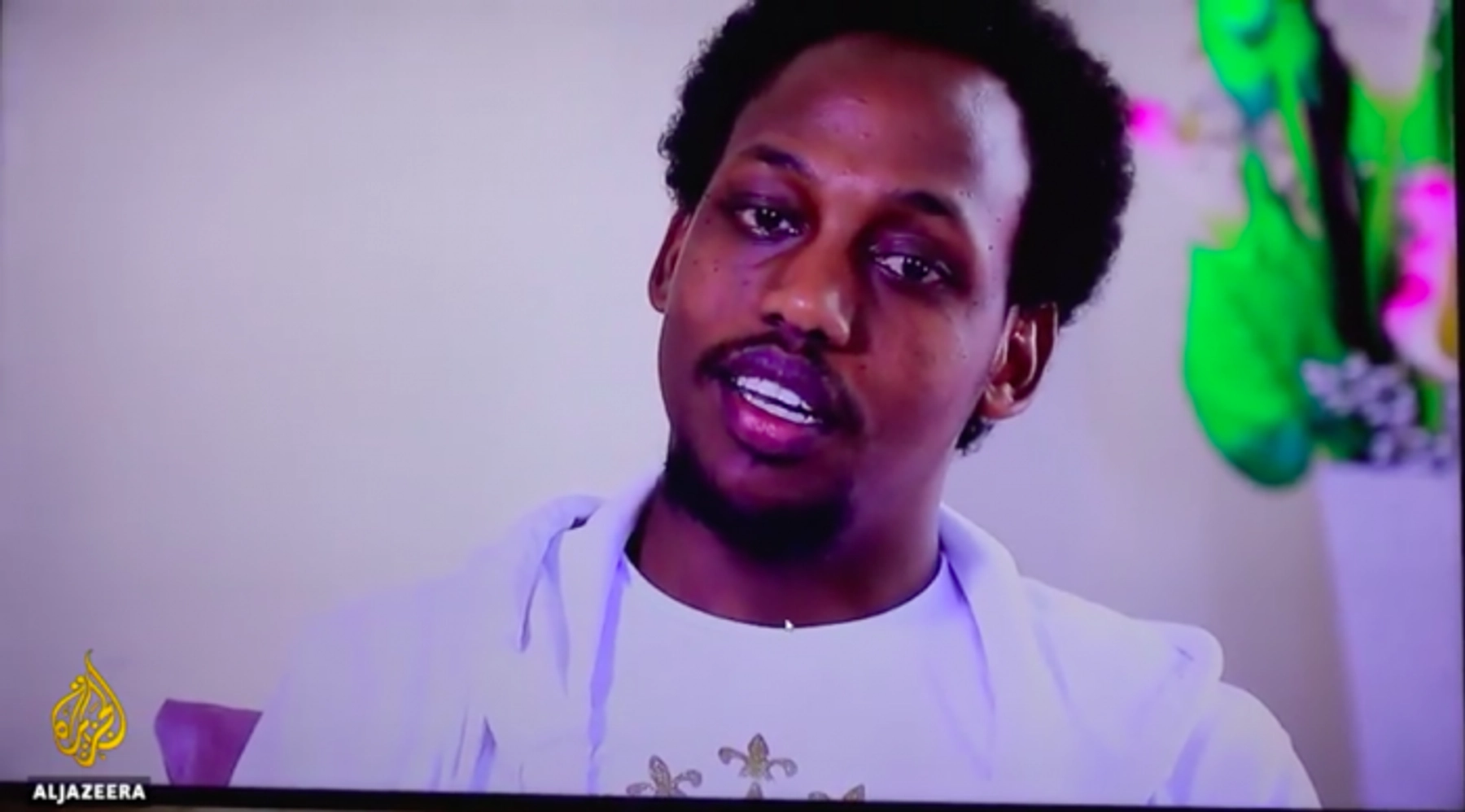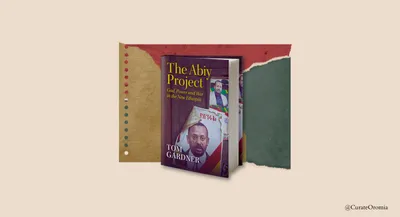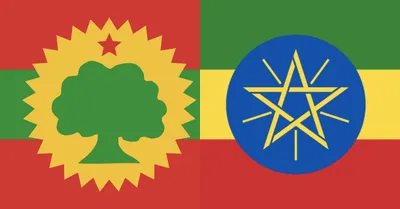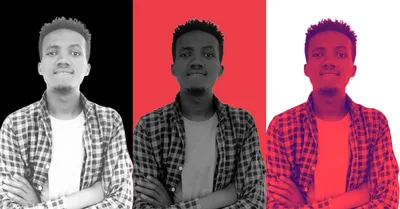Oromia Police said “We will die for you”- Guyo Wariyo

Source: Al Jazeera, The Listening Post.
Guyo Wariyo Abbajirma is an Oromo Journalist who worked at Oromia Media Network (OMN) until it was shut down by Abiy Ahmed’s administration following the assassination of artist Hachalu Hundessa on the 29th of June, 2020. Guyo himself was briefly arrested two weeks after Hachalu’s murder accused of “spreading hate speech and inciting communal violence.”
This is part two of Guyo’s interview with Curate Oromia.
CO: Take us through the day you recorded the interview with Hachalu? What was his state of mind?
Our appointment with Hachalu was on Friday at 3 pm, local time. He called me around 2 while I was producing news at OMN and said, “I need to get a haircut; would you have time for me in case I am late?”
“No problem, get a haircut and come,” I replied.
When he came to our studio after getting a haircut, he was very happy and energetic, as he was during the course of our interview. Sometimes, you could tell that he was a bit under pressure, but given the gravity of the issues he was about to discuss, it was understandable. The whole point of the interview was to address the rumours that were circulating on social media and also to weigh in on what’s happening in Oromia.
After we did the interview, came the editing stage where Hachalu and I sat down together and discussed everything. For example, we cut out three parts on his request and one on my suggestion. This was something I had never done with any of my other guests, but with Hachalu, we did it as a team. Then, we released the three minutes-long trailer which stayed on the air until Monday, the day OMN broadcasts Keessumma. Monday, 22nd of June, the whole interview was broadcast to a record-breaking number of viewers in Ethiopia. On Facebook live alone, it was watched by hundreds of thousands of people.
The only people who were infuriated by his remarks were Amhara nationalists
Almost everyone praised Hachaclu for the points he made in the interview: he criticized both the government and the opposition; he called Emperor Menilik a thief, and also said the “reform” has gone off track. The only people who were infuriated by his remarks were Amhara nationalists who immediately started a hate campaign against him on social and other YouTube-based media. Hachalu, in the meantime, couldn’t be happier.
When we met for lunch on Wednesday, two days after the interview aired, he said:
“I made history on three different occasions throughout my life. The first time was when I released Maalan Jira. I got a lot of praise and love from my people for that song. The second time was the Gerarsa I performed at Millennium Hall. On that stage, I was praised as a freedom fighter. Two years down the line, I came under criticism, but you liberated me from it. You helped me become a hero in the eyes of my people once again. You united me with my people.”
“For this,” he said, “I want to give you a gift. What do you want from me?” He had invited me to his house, you know? We had a plan… Unfortunately, they assassinated him four days later.
CO: How did you hear the news?
I was at home and received a call from Girma Gutema, the executive director of OMN. He said he had seen a rumor on Facebook about Hachalu being attacked and asked me to check upon him.
So, I called Hachalu; he didn’t pick up. I tried his second phone, that didn’t work either. I called Feyisa Lelisa, who is his close friend, but he also didn’t answer. I called Feyisa’s brother, Adugna Lelisa. No answer. I then called Adugna’s wife, a journalist with the VOA, who said “Hachalu has been shot by someone somewhere in Finfinne.”
I got dressed and was getting ready to go out when she called me again: “He has died.”
If Hachalu was murdered, how safe could I be?
I was walking down the stairs of my fourth-floor apartment; I fall down. I became numb. Dizzy. It was like the whole world has turned upside down. I somehow managed to call my friends who lived nearby; they quickly came in a car and took me to a friend’s house and locked me inside. If Hachalu was murdered, how safe could I be? They were worried about my safety. Confused and numb, I stayed up the whole night in an empty house.
Early in the morning, I returned to my wife and daughter and slept for some three hours. When I woke up, I found our neighborhood surrounded by city thugs. Do you know the Balderas group? It was these people who had been relentlessly threatening both Hachalu and me after that interview, so I didn’t feel safe. With the help of a close friend, my family and I moved to a relative’s house in another part of Finfinne where we stayed for 14 days until Oromia Police come to arrest me.
CO: How did they find you?
I wasn’t hiding from them. It was from Amhara nationalists that I was hiding from. Hachalu was assassinated; how can I feel safe? The government, however, thought that I was hiding from them. The Ethiopian National Defence Forces went to my parents’ house in Negele Borena and arrested five of my family members. Not Oromia police, but ENDF! “Until you return to Ethiopia, we are not going to release your family members” is what the general of the southern division of the Ethiopian Army told me when I spoke to him on the phone. “Even your mother will be next” he continued.
I told him that I was in Finfinne, that if he wanted to get me, I could give him my address. “Please, release my family members,” I begged. After I gave him my address and he was sure that I was still in the country, he released three of them.
It was on a Friday morning, if I am not mistaken, that I was looking through the window and saw the house we were staying in being surrounded by Oromia Liyu Police. They came in five cars to take me, believe it or not. To take one Journalist! So, I went downstairs and informed my wife that the police are outside. She panicked and tried to hide me somewhere.
Before I could get out, the Liyu police were already dragging some of my family members into their car. I raised my hand and told them that I’m here! As they handcuffed me and we started walking towards their car, my family followed behind, until at some point one Liyu Police pointed his gun at them! What could they do but go back?
At around 11 AM, they brought me to Oromia Police Commission in Finfinne, a neighborhood known as Global Hotel. There must have been a school around there because the area was full of people, who, upon recognizing me, started taking pictures and recording videos. I was so relieved. I said to myself that should anything happen, should they kill me, at least people would know where I was last seen. My pictures would somehow make it to social media and people would know where I am. They then put me in a dark, roughly 4-meter square room; the handcuff was still on my wrist and there were lots of mosquitos. It was horrible.
A member of the Liyu Police barged in pointing his gun at my head. I retreated in shock
There were two kinds of police there: the regular Oromia Police and the Oromia Liyu Police. The regular Oromia police were really sad when they saw me there. They were good people; they came to my room and tried to encourage me. “This is the house of wonderful people. You shouldn’t feel bad,” one of them said.
The Liyu Police, on the other hand, was incredibly rude. When I could no longer bear the mosquito bites, I knocked on the door to ask if I could use the restroom. A member of the Liyu Police barged in pointing his gun at my head. I retreated in shock. Luckily, one of the regular Oromia police was watching from distance; he came rushing and kicked the Liyu Police out of the room. I heard the two shouting at each other outside.
When after a couple of hours the police commander came to see me, he said, “We thought that you had fled from the country. How are you still here?
“Why would I flee?”, I asked? To which he replied, “well, you spoke to the media accusing us, talking about us negatively. That’s why we thought that you had left the country.”
Ironically, it was not long ago that I saw Abiy Ahmed speaking on ETV, where he was saying that people are no longer going to be detained in dark rooms. I mentioned that to the commander. I told him, one week after Abiy spoke, you detain me in a dark room for 12 hours? He said, “we are only holding you here for the time being.”
Then, I was handed over to the Federal Police who came in three cars to transfer me to Meakelawi. There were seven Federal Police; all seven of them were Oromo. They immediately recognized me, of course. They were so happy; we hugged each other. Sitting between them on our way to Meakelawi, they said that I should not have been arrested and apologized for the way I was treated by Oromia Liyu Police. They said, “We are not rude like them. Now, you are safe. We will die for you.” I became very happy. They took me to Meakelawi in Enqulal Fabrika and had my name registered. That’s where I stayed for the next fifty days.
CO: How were the conditions in prison?
The police and personnel at Meakelawi were actually good people. They were caring. I wasn’t mistreated there. When I appeared in court, I told the judge about how I was mistreated by Oromia Liyu police and the fact that I was imprisoned in a dark room for 12 hours. I brought up Abiy’s own words about not throwing people in dark rooms.
The judge was furious upon hearing my account and instructed Oromia Liyu police to write a letter to the court. They ignored him, of course. So, you know, there are still good people within the justice system, but they have no power. The police can do whatever they want.
After my Lawyer spoke to the media about my predicament, what happened to me became known to the public. When the head of the Ethiopian Human Rights Commission, Daniel Bekele, came to visit me in prison, he said that he had heard about what happened to me and tried to encourage me. “This is a tough time for you,” he said, “stay strong.” I will fight to get you released.” “Prison is a good school,” he added before he left.
CO: Why were you arrested? What was the government’s case against you?
They had none. I was arrested because the attorney general was trying to build a case against OMN out of thin air. They claimed that OMN had deliberately removed part of the interview where Hachalu spoke about receiving threats and therefore OMN had a hand in his murder.
First, there isn’t a single place in that interview where Hachalu talks about a threat being made on his life. What he said was people from all four parts of Wellega had been calling him telling him to please leave the country if he could, that he does not know who is going to kill him, and that they do not want to lose him. The attorney general, however, took this statement—the affection and deep concern the people of Wellega had for Hachalu— and deliberately mischaracterized it to imply that a threat was made on his life! I even made a point of asking Hachalu if anyone has threatened him and his answer was NO!
They also aired a doctored audio where a supposed member of the Oromo liberation army threatens Hachalu having watched what he had said in the interview on OMN. Embarrassingly, this is the same part in the interview that the attorney general accuses OMN of removing. In other words, the supposed OLA member has watched what was not aired in the interview. Let’s also not forget the fact that the phone number with which the threatening audio was sent to Hachalu was active on the texting app Telegram while the rest of Ethiopia was under an internet blackout. It was a travesty.
I was approached by the deputy attorney to testify against Jawar Mohammed
They also claimed that I have committed a crime by airing an interview that contains hate speech and has incited communal violence. There isn’t a shred of evidence for that; so, instead of setting me free, they dragged me from prison to prison “for investigation” in the hope that I would finally give up and admit to something I have not done.
When it became clear that they could not charge me, I was approached by the deputy attorney general, Fekadu Tsega, who said “we need you to testify against Jawar Mohamed. If you are scared for your safety, we can send you somewhere else. Or, should you wish to stay here, we will give your own personal security.” And many other things in exchange for testifying against Jawar.
My immediate supervisor was Mr. Dejene Gutema followed by Mr. Girma Gutema; I had no relationship with Jawar. I didn’t take orders from him, so what am I testifying exactly? The whole thing was absurd, you know?
They didn’t stop there; they went ahead and talked to my relatives, some of whom are Abba Gaddas, to convince me to send an innocent man to jail.
I rejected all their demands, at which point, the deputy Attorney General became furious and said “you either work with us or you will stay here for years!”
“You can keep me here for 100 years if you wish,” I replied. “I am not going to testify on an innocent man!”
Back in the court, the police couldn’t even file a proper case against me, so after a lot of back and forth, I was set free on bail after 50 days.
CO: The Oromo at large are happy at the news of your release from Prison. What then is your assessment of what is happening in Oromia today? What went wrong?
We have been struggling for our rights for a long time. We have been fighting for our nation and at last, we won! But the victory was taken from us. The way I see it, silence is the reason for our current crisis. When people in Wellega are killed, those in Borana, Hararge, or Wollo should not have been silent and vice versa. We should fight together.
CO: The institution you worked for, OMN, had a policy of silence and had refused to cover conflict and state violence in Welega and Guji for almost one year. Why was silence necessary?
I believe OMN is an independent institution and has always worked to bring Oromos together. In the beginning, we were under the assumption that we should encourage and promote negotiations instead of highlighting differences. Only later, did I, for example, understand that there was a political agenda behind it on the part of the government.
In any case, what’s happening now is the consequence of our silences in the past. When government soldiers were killing people in Wellega, Guji, and Borana, we stayed silent until it came all the way to Finfinne and knocked on our doorstep. That was a mistake.
Throughout our history, we have managed to build two strong institutions: The Oromo Liberation Front and Oromia Media Network. I believe that one journalist amounts to one thousand soldiers. The media is our weapon, and journalists are our soldiers; as such, we should cover the problems, grievances, and challenges of our people across Oromia. That is our responsibility. We can not afford to sleep and wake up later, as is the case now.
CO: What is next for Guyo?
I have to fight for my people, for my nation that has suffered for so long. The only way I can contribute is through Journalism. God willing, I will return soon and people will hear my voice once again, either on local or international media.
We need your support
We trust you found something of value in this article. If so, we kindly ask you to consider helping Curate Oromia continue its work.
If you believe in the importance of independent voices and honest reporting, we invite you to support our efforts through our GoFundMe campaign.
Every contribution, however small, goes directly to our writers and the expansion of our reach.
Thank you for your support.



